(完整)高中英语名词讲解及练习
高中英语名词性从句知识讲解以及练习题 附答案
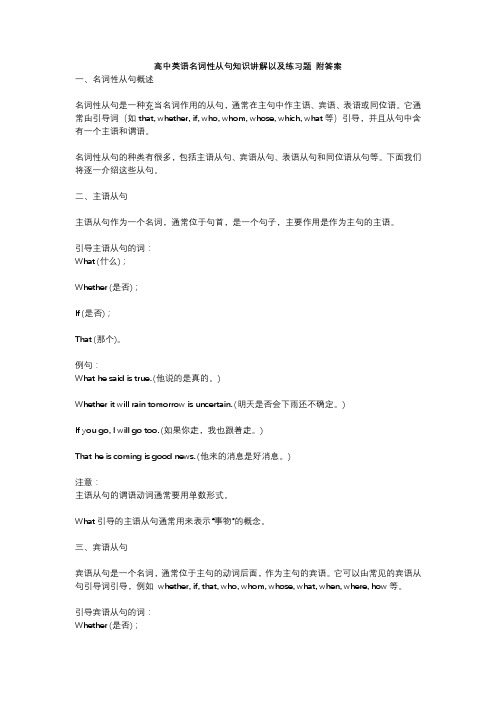
高中英语名词性从句知识讲解以及练习题附答案一、名词性从句概述名词性从句是一种充当名词作用的从句,通常在主句中作主语、宾语、表语或同位语。
它通常由引导词(如that, whether, if, who, whom, whose, which, what等)引导,并且从句中含有一个主语和谓语。
名词性从句的种类有很多,包括主语从句、宾语从句、表语从句和同位语从句等。
下面我们将逐一介绍这些从句。
二、主语从句主语从句作为一个名词,通常位于句首,是一个句子,主要作用是作为主句的主语。
引导主语从句的词:What (什么);Whether (是否);If (是否);That (那个)。
例句:What he said is true. (他说的是真的。
)Whether it will rain tomorrow is uncertain. (明天是否会下雨还不确定。
)If you go, I will go too. (如果你走,我也跟着走。
)That he is coming is good news. (他来的消息是好消息。
)注意:主语从句的谓语动词通常要用单数形式。
What引导的主语从句通常用来表示“事物”的概念。
三、宾语从句宾语从句是一个名词,通常位于主句的动词后面,作为主句的宾语。
它可以由常见的宾语从句引导词引导,例如whether, if, that, who, whom, whose, what, when, where, how等。
引导宾语从句的词:Whether (是否);If (是否);That (那个);Who (谁);Whom (谁);Whose (谁的);What (什么);When (何时);Where (何处);How (如何)。
例句:I know that he is coming. (我知道他要来。
)I wonder if he is telling the truth. (我想知道他是否说了真话。
高中英语语法详讲 名词词组讲解语法以及习题
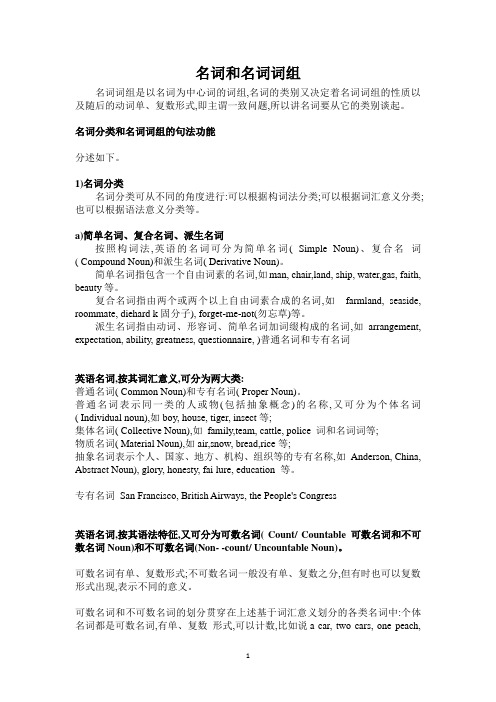
名词和名词词组名词词组是以名词为中心词的词组,名词的类别又决定着名词词组的性质以及随后的动词单、复数形式,即主谓一致问题,所以讲名词要从它的类别谈起。
名词分类和名词词组的句法功能分述如下。
1)名词分类名词分类可从不同的角度进行:可以根据构词法分类;可以根据词汇意义分类;也可以根据语法意义分类等。
a)简单名词、复合名词、派生名词按照构词法,英语的名词可分为简单名词( Simple Noun)、复合名词( Compound Noun)和派生名词( Derivative Noun)。
简单名词指包含一个自由词素的名词,如man, chair,land, ship, water,gas, faith, beauty等。
复合名词指由两个或两个以上自由词素合成的名词,如farmland, seaside, roommate, diehard k固分子), forget-me-not(勿忘草)等。
派生名词指由动词、形容词、简单名词加词缀构成的名词,如arrangement, expectation, ability, greatness, questionnaire, )普通名词和专有名词英语名词,按其词汇意义,可分为两大类:普通名词( Common Noun)和专有名词( Proper Noun)。
普通名词表示同一类的人或物(包括抽象概念)的名称,又可分为个体名词( Individual noun),如boy, house, tiger, insect等;集体名词( Collective Noun),如family,team, cattle, police 词和名词词等;物质名词( Material Noun),如air,snow, bread,rice等;抽象名词表示个人、国家、地方、机构、组织等的专有名称,如Anderson, China, Abstract Noun), glory, honesty, fai lure, education 等。
高中名词专项练习题及讲解

高中名词专项练习题及讲解名词是英语语法中的一个重要组成部分,它代表了人、地点、事物或概念。
在高中英语学习中,掌握名词的用法对于提高语言能力和理解力至关重要。
以下是一些名词专项练习题及相应的讲解,帮助学生更好地理解和运用名词。
练习题1:名词的单复数形式1. This ___ is very heavy.A. boxB. boxesC. boxs2. There are many ___ in the garden.A. leafB. leavesC. leafs答案与讲解:1. 正确答案是A。
"box"是单数形式,表示一个箱子。
名词的单数形式通常用于指代一个单独的个体或事物。
2. 正确答案是B。
"leaves"是复数形式,表示多个叶子。
在英语中,很多名词的复数形式是通过在词尾加上"-s"或"-es"来形成的。
练习题2:不可数名词1. Water is an ___.A. foodB. drinkC. advice2. We need to buy some ___ for the party.A. furnituresB. informationsC. drinks答案与讲解:1. 正确答案是C。
"advice"是一个不可数名词,表示建议或意见,它没有复数形式。
2. 正确答案是C。
"drinks"是可数名词,表示饮料,可以有复数形式。
而"furniture"和"information"是不可数名词,没有复数形式。
练习题3:名词所有格1. The ___ of the house is very beautiful.A. roofB. roofsC. roof’s2. My ___ is in the classroom.A. bookB. booksC. book’s答案与讲解:1. 正确答案是C。
高中英语名词的用法及练习70道题
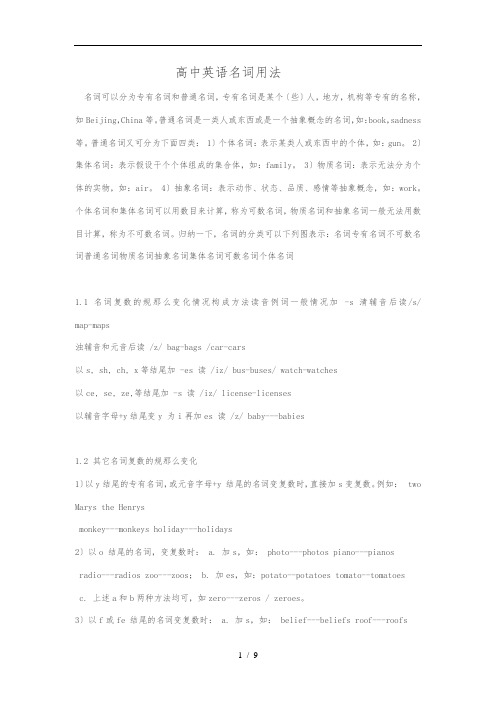
高中英语名词用法名词可以分为专有名词和普通名词,专有名词是某个〔些〕人,地方,机构等专有的名称,如Beijing,China等。
普通名词是一类人或东西或是一个抽象概念的名词,如:book,sadness 等。
普通名词又可分为下面四类: 1〕个体名词:表示某类人或东西中的个体,如:gun。
2〕集体名词:表示假设干个个体组成的集合体,如:family。
3〕物质名词:表示无法分为个体的实物,如:air。
4〕抽象名词:表示动作、状态、品质、感情等抽象概念,如:work。
个体名词和集体名词可以用数目来计算,称为可数名词,物质名词和抽象名词一般无法用数目计算,称为不可数名词。
归纳一下,名词的分类可以下列图表示:名词专有名词不可数名词普通名词物质名词抽象名词集体名词可数名词个体名词1.1 名词复数的规那么变化情况构成方法读音例词一般情况加-s 清辅音后读/s/ map-maps浊辅音和元音后读 /z/ bag-bags /car-cars以s, sh, ch, x等结尾加 -es 读 /iz/ bus-buses/ watch-watches以ce, se, ze,等结尾加 -s 读 /iz/ license-licenses以辅音字母+y结尾变y 为i再加es 读 /z/ baby---babies1.2 其它名词复数的规那么变化1〕以y结尾的专有名词,或元音字母+y 结尾的名词变复数时,直接加s变复数。
例如:two Marys the Henrysmonkey---monkeys holiday---holidays2〕以o 结尾的名词,变复数时: a. 加s,如: photo---photos piano---pianosradio---radios zoo---zoos; b. 加es,如:potato--potatoes tomato--tomatoesc. 上述a和b两种方法均可,如zero---zeros / zeroes。
高中英语-名词性从句 专题讲解及巩固练习(含答案)
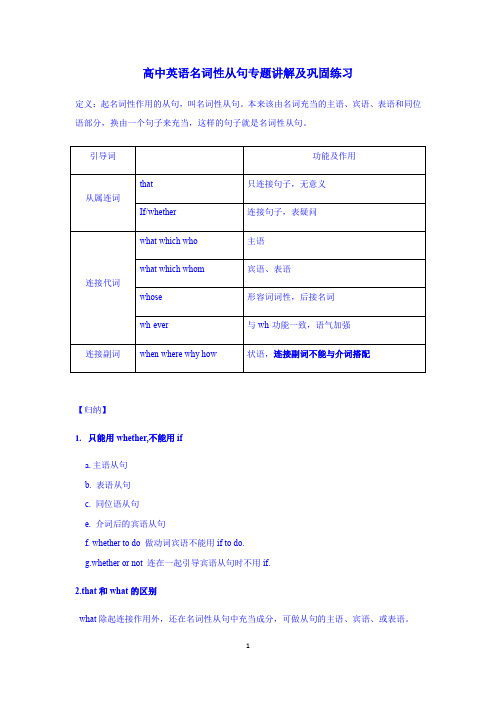
高中英语名词性从句专题讲解及巩固练习定义:起名词性作用的从句,叫名词性从句。
本来该由名词充当的主语、宾语、表语和同位语部分,换由一个句子来充当,这样的句子就是名词性从句。
【归纳】1.只能用whether,不能用ifa.主语从句b. 表语从句c. 同位语从句e. 介词后的宾语从句f. whether to do 做动词宾语不能用if to do.g.whether or not 连在一起引导宾语从句时不用if.2.that和what的区别what除起连接作用外,还在名词性从句中充当成分,可做从句的主语、宾语、或表语。
that在名词性从句中不充当任何成分,只起连接作用。
例:I have no doubt that he will come.I have no idea what he did that afternoon.一.主语从句:在复合句中作主句的主语。
●__________ he is a famous singer is known to us.●__________ he will go to America is not yet fixed.●__________ she’s coming or not doesn’t matter too much.●__________ broke the glass yesterday is not clear.【keys】That; When/How; Whether; Who【归纳】1.为避免主语冗长,句子头重脚轻, 经常用it作形式主语, 主语从句放在后面作真正的主语。
例:That her hair was turning gray worried her a lot.-----It worried her a lot that her hair was turning gray.常考句型:It’s likely / possible / important / necessary / clear that…很可能/ 重要的是… / 必要的是… / 很清楚…It’s said / reported that…据说/据报道…It seems / appears / happens that…显然、明显、碰巧…It’s been announced / declared that…已经通知/宣布…It’s no wonder that…并不奇怪/无疑…It’s a pity/a fact /a common knowledge / a common saying that…2.if不能引导主语从句,只能用whether3.单个的主语从句作主语时,谓语动词用句单数形式;如果是两个或两个以上的主语作主语,谓语动词则视情况而定。
高中名词性从句全面讲解及练习含答案

高中英语讲义---- 名词性从句(主从、表从、宾从,同从)1,陈述句做名从用连词that + SV, that 表主句确定从句完好,不做成分。
主从可用it 做形式主语,宾从第一个that 可省略。
You study hard.主从:That you study hard is known to us.= It is known to us that you study hard.表从:My opinion is that you study hard .宾从:I think (that) you study hard. …and that (不能省略)….同从:My opinion that you study hard is known to us. *比拟同从和主从!●一般抽象名词后对其进展说明和说明的完好句子就是其同位语从句,不完好就是定语从句。
I appreciate your idea that we have an exam every week. (that后完好—同从)I appreciate your idea that you came up with last time.(that后不完好---定从)2,一般问句做名从用连词whether(是否) + SV,whether表主句不愿定从句完好,宾从中可用if(介词后或宾从后有or not时只用whether)。
Does your friend like English ?主从:Whether your friend likes English isn’t clear .=It isn’t clear whether your friend likes English.表从:My question is whether your friend likes English.宾从:I don’t know whether/ if your friend likes English.同从:My question whether your friend likes English isn’t clear.3, 特殊问句做名从用疑问词(连词)+ SV, 疑问词做主语时干脆+谓语。
高中英语语法专题:名词(含答案)
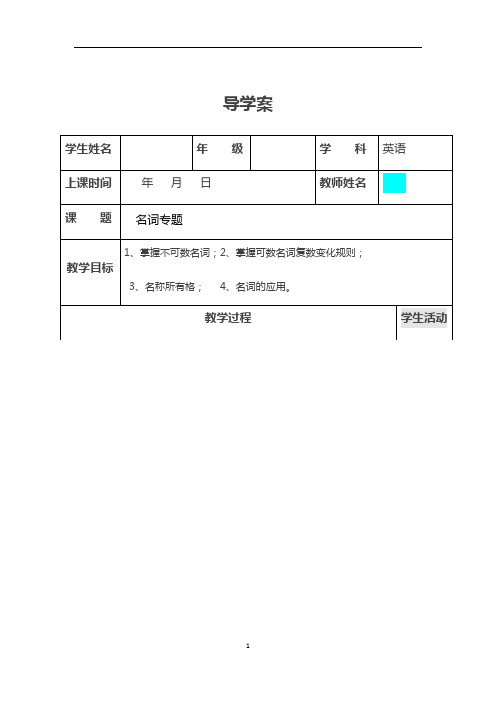
导学案【词汇串烧】Fall in Love with EnglishHiding behind the loose dusty curtain, a teenager pack ed up his overcoat into the suitcase. He planned to leave home at dusk though there was thunder and lightning outdoors. He had got to do this because he was tired of his parents’ nagging about his English study and did not want to go through it any longer. He couldn’t get along well with English and dislike d join ing in English classes because he thought his teacher ignore d him on purpose. As a result, his score in each exam never add ed up to over 60.His partner was concerned about him very much. She understood exactly what he was suffer ing from, but entirely disagree d with his idea. In order to calm him down and settle his problem, she talked with him face to face and swap ped a series of learning tip s with him. The item s she set down helped him find the highway to studying English well.The teenager was grateful and got great power from his friend’s words. Now, he has recover ed from being upset and has fall en in love with English.爱上英语有个少年躲在积满灰尘的松散窗帘后把大衣装入手提箱。
高中英语名词性从句讲义及练习

高中英语名词性从句讲义及练习1.名词性从句的分类主语从句、宾语从句、表语从句、同位语从句Eg. 1) I know that he came to Beijing yesterday.2)What he said is rather interesting.3)This is what he’s emphasizing about.4)Linda, who is your teacher, will visit you in the next weekend.2.如何判断是哪一种从句主语从句:What she said is interesting.What he confessed will make you suffered.()V ……宾语从句:1)I hate that you always talk like that. Vt + 句子2)I’m interested in what he said just now. 介词+ 句子3)I’m sure that he will come tomorrow. 形容词+ 句子表语从句:This is what I said yesterday.That’s why I don’t wanna be with you any more.同位语从句:He revealed the fact that he doesn’t like you anymore .3.名词性从句如何选择连词I know _______ he likes.1)阅读题和改错题里找谓语,语篇填空里看_______(空白格)前面还是后面为句子。
2)找到谓语后确定从句范围。
3)看连词在从句中是什么位置。
作主语、宾语、定语或是状语。
I know _______ is good.从句中做主语:人who 物:whatI know _______ he likes.从句中做表语、宾语:人who/whom 物:whatI know _______ book is good.从句中做定语:whichI know _________ he lives.从句中做状语:where when why how占位词:that whether if当堂练习:1._______________ he said at the meeting astonished everybody present.2._______________ worries me a lot is that I’m always forgetting ___________ I have just done.3.A modern city has been set up in __________ was a wasteland ten years ago.4.With his work completed, the business stepped back to his seat, feeling pleased _________ he was a man of action.5.______________ makes me this shop different is that it offers more personal.6.See the flag on top of the building? That was __________ we did this morning.7.After _____________ seemed an endless effort, the patient was finally able to take a normal walk.8.They have not made any decision on _____________ they are going do to deal with the waste and control pollution.9.The other day, my brother drove his car down the street at __________ I thought was a dangerous speed.10.It was a matter of _______________ would take the position.[注意]1)what 和how 的区别I don’t know what I should do.I don’t know how I should do.练习:It is none of your business ___________ other people look at you.It is none of your business ___________ other people say.2)which 和what的区别I know ________ book is funny.I know _______ is funny.练习:It is generally considered unwise to give a child ____________ he or she wants._______________ team wins on Saturday will go through to the national championships.3) whether 和if 的区别_____________________ the 2024 Olympic Games will be held in Beijing is not known yet.If 只引导宾语从句whether和if的区别。
- 1、下载文档前请自行甄别文档内容的完整性,平台不提供额外的编辑、内容补充、找答案等附加服务。
- 2、"仅部分预览"的文档,不可在线预览部分如存在完整性等问题,可反馈申请退款(可完整预览的文档不适用该条件!)。
- 3、如文档侵犯您的权益,请联系客服反馈,我们会尽快为您处理(人工客服工作时间:9:00-18:30)。
名词一、名词的分类专有名词主要是指人名、地名或某类人或事物的名称,如Beijing,China等。
普通名词是一类人或东西或是一个抽象概念的名词,如:book,sadness等。
专有名词抽象名词不可数名词物质名词普通名词集体名词个体名词可数名词个体名词和集体名词可以用数目来计算,称为可数名词(Countable Nouns),物质名词和抽象名词一般无法用数目计算,称为不可数名词(Uncountable Nouns)。
Proper Nouns:指人名、地名及某些人和事物专有的名称Eg: Diana; Beijing; Americans; English; May; New Year’s Day注意:专有名词的第一个字母要大写Common Nouns:一类人或东西或是一个抽象概念的名词1. Individual Nouns: 指作为个体而存在的人或东西可以指具体的人或物。
Eg: aunts; a panda; apartments也可指抽象东西。
Eg: a year; fairy tales; a dream2. Collective Nouns: 表示若干个个体组成的集合体Eg: army; audience; crew; family; team; police; government; public集体名词有时作单数看待,有时作复数看。
一般来说,视为整体时作单数看,突出它的成员时作复数看。
His family _____ not large.His family ______ all music lovers.有少数集体名词通常用作单数。
Eg: The gang is being hunted by the police.Our company is sending him to work in Berlin.个别集体名词则多作复数看待。
Eg: The police are looking for him.3. Material Nouns: 指无法分为个体的物质。
Eg: beer; cake; cloth; cotton; detergent; fur; ice; paint; paper; soil一般来说,物质名词是不可数的,因而没有复数形式。
但有一些特殊情况:1) 有些物质名词可用作可数名词,表示“一份”、“一杯”、“一种”Eg: Two strong black coffees, please. ( 两份)Three beers, please. (三杯) It was a special tea. (一种)2)个别物质名词的复数形式可以表示特别的意义。
Eg: rains (雨季)sands (沙滩)snows (积雪) waters(海域)…4.Abstract Nouns:表示动作、状态、品质、感情等抽象概念Eg: education; love; policy; trust; nature; fashion; relief; silence; truth,etc.多数情况下,这种名词常用于单数形式,不加任何冠词。
Eg: He’s learning French for fun.I wish you good luck.抽象名词转化为可数名词。
Failure is the mother of success. (失败与成功在此为抽象概念)As a teacher , she is a success, but as a mother, she is a failure because she devotes little time to looking after her child. (成功者,失败者,可数)二、名词的数不可数名词一般没有单复数之分,它包括抽象名词、物质名词和专有名词。
例如:health, advice, glass, wood, English, America不可数名词作主语,谓语动词须用单数形式。
Notes:1. stomach -- stomachs2. 以元音+y或以专有名词+y结尾的名词,直接在词尾加-s. Eg: boys; toys; Henrys3. 以-o 结尾的名词+ es在课本中出现的有hero, potato, tomato;其余以-o结尾的词+ s: (photo, piano, radio, bamboo ,zoo…)4:以f/fe结尾只加-s的词:proofs; gulfs; cliffs; roofs; serfs; beliefs; chiefshandkerchief(手帕,手绢)的复数形式两者都可以。
不规则变化:变内部元音:foot-feet, tooth-teeth, goose-geese ,mouse-mice, man-men, woman-women, policeman-policemen词尾加-en或ren:ox-oxen, child-childrenouse – ice:mouse-mice; louse-lice(虱子)有些外来词的不规则复数形式:Eg: analys i s-analys e s; bas i s-bas e s; thes i s-thes e s;cris i s-cris e scriteri on-criteri a; phenomen on-phenomen a; medi um-medi a单复数相同的情况:sheep; deer; means; fish; works; species; Chinese; Japanese以及由汉语音译表示度量衡、货币等单位的名词。
Eg: yuan, jiao, fen, jin, mu只有复数形式的情况:trousers(裤子); glasses(眼镜); compasses(圆规) a pair of thanks; clothes; remains; goods; people; cattle“某国人”的复数形式:•单、复数相同Chinese, Japanese, Swiss,…•词尾加-s Africans, Asians, Canadians, Australians, Italians,……•变man为men Englishman---Englishmen, Frenchman---Frenchmen但:German---Germans复合名词的复数形式:1.一般将主体名词变为复数。
father-in-law →fathers-in-law, passer-by →passers-by,looker-on→lookers-on, editor-in-chief →editors-in-chief2.无主体名词的在词尾加复数。
如:grown-ups, good-for-nothings(无用的人),go-betweens (中间人),look-outs(守望者)3.由man, woman,构成的复合名词应将前后两个词都变成复数。
men-doctors, women-drivers, women-singers•boyfriends, girlfriends, boy students, girl students有些名词可以兼作可数名词和不可数名词。
beauty(美,美貌)---a beauty(一个美人/物)danger(危险)—a danger(一件危险的事/人)failure(失败)—a failure(一件失败的事/人)honour(光荣)—an honour(带来荣誉的/或事)pity(遗憾)—a pity(一件可惜的事)success(成功)—a success(一件成功的事/人)surprise(惊奇)—a surprise(一件令人吃惊的事)pleasure(乐趣)—a pleasure(一件有趣的事)worry(担心)—a worry(一件令人担心的事)experience(经验)—an experience(一次经历)service(服务)—a service(一个服务机构)英语中有许多对词,一个可数,一个不可数。
a poem(一首诗) poetry(诗歌总称)a machine(一台机器) machinery(机器总称)a job(一件工作) work(工作)a laugh(一个笑声) laughter(笑声)a permit(许可证) permission(允许)a garment (一件衣裳) clothing(衣裳总称)a bag(case) (一件行李) luggage, baggage(行李)a loaf (一只面包) bread(面包)a hair(一根头发) hair(头发)几个名词的特殊用法1. hairHis hair is white.(他的头发是白的。
)He has a few grey hairs.(他有几根白的头发。
)2. fruitThe fruit is sweet.He likes pears, peaches, grapes and other fruits.3. policeThe police are searching for the murderer.dozen, scoretwo (many, several) dozen pencils three dozen of them / these pencilsdozens of students two score of students scores of peopleword(消息,通知), man(人类),前面不加冠词,也不用复数形式,谓语用单数。
三、名词的格英语中的名词(代词)有三个格:主格、宾格、所有格。
所有格表示所有关系,修饰另一名词,作定语,它有两种形式:一种是由名词词尾加’s构成,另一种是由介词of加名词构成,前者多用来表示有生命的东西,后者多用来表示无生命的东西。
所有格的形式:1. 一般的名词所有格在后面加’s:Mary’s book2. 以–s 结尾的复数名词所有格在后面仅加’:Teachers’ Day, the students’ reading-room3. 以–s 结尾的专有名词所有格:Engels’s works 或Engels’ works4. 复合名词的所有格是在其词尾加’s:his mother-in-law’s photothe editor-in-chief’s opinion5. 如果一样东西为两人共有,则只在最后一个名词后加’s,如果是分别所有,则两个名词后都要加’s:Tom and Marry’s father, Tom’s and Marry’s fathers6. 在表示“某人家”、“店铺”的所有格时,一般省略它所修饰的名词:at the doctor’s,at the barber’s, at Mr. Green’s, at the tailor’s7. 有些表示时间、距离、国家、城市、团体、机构等无生命东西的名词,也可以加’s来构成所有格:today’s newspaper ten minutes’ walk China’s industry the station’s waiting-room the earth's surface a dollar's worth8. 凡不能加’s 构成所有格的名词,都可以与of 结成短语,来表示所有格关系。
